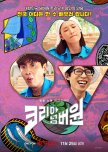This review may contain spoilers
Documentary meets game show meets comedy act - liked it more than anticipated
9.5/10 is my rating. This is a 2022 reality variety show with 8, 41-52 minute episodes.
First I provide a Unique Synopsis then Review
Synopsis
In each episode Yoo Jae-suk, Kim Yeon-koung and Lee Kwang-soo travel to wherever a master of a traditional process resides to take part in their craft. They are taught and perform each process from beginning to end. It is naturally comedic as they obviously are not masters themselves so they struggle and make errors all the while competing with each other to earn the distinction of the master declaring one of the best at that craft.
Because this series centers around these three participants a little about each person:
*Yoo Jae suk was born in 1972 and would have been about 50 when the series aired. He is a popular Korean comedian, presenter and tv personality.
*Kim Yeon Koung was born in 1988 and would have been about 34 when the show aired. She is a pn accomplished professional volleyball player. She has a large social media presence with many followers (over 1 million) on her sites and channels.
*Lee Kwang Soo was born in 1985 and would have been about 42 when the show aired. He started as a model but quickly got into acting and also participates at various levels in variety shows.
Review
One if the most fascinating aspects of this series is seeing and learning about these processes from start to finish along with the participants. They go to Junghueng to learn how to make Giwa which are traditional clay roof tiles. They struggle on the mud flats of Shinan they pursue the Getbal, baby octopuses. They go to Seocheon to harvest plants to explore mosi, traditional woven fabric. In Damyang they discover that Jang traditional sauces are very difficult to make. In Namihae they find out how anchovy, Jukbangryeorn, anchovy are trapped in a traditional tidal weir and processed. Korean Jjock comes from the indigo plants in Naju and the three discover making dye and dying cloth is a seriously taxing process. Even the makgeoli, sweet rice wine, made in Busan is a laborious process.
The locations are beautiful but you can see evidence of the heat (they comment but you can also see their flushed faces and them sweating through the processing) the participants are working in which lends a greater appreciation for those that do it for a living. It is all very hard work but the results are beautiful/wonderful.
Spoiler
The only critique was the masters decided, in the presence of the participants, who deserved the thumbs up for that activity. An honest assessment of how each one did would have made that aspect more meaningful.
First I provide a Unique Synopsis then Review
Synopsis
In each episode Yoo Jae-suk, Kim Yeon-koung and Lee Kwang-soo travel to wherever a master of a traditional process resides to take part in their craft. They are taught and perform each process from beginning to end. It is naturally comedic as they obviously are not masters themselves so they struggle and make errors all the while competing with each other to earn the distinction of the master declaring one of the best at that craft.
Because this series centers around these three participants a little about each person:
*Yoo Jae suk was born in 1972 and would have been about 50 when the series aired. He is a popular Korean comedian, presenter and tv personality.
*Kim Yeon Koung was born in 1988 and would have been about 34 when the show aired. She is a pn accomplished professional volleyball player. She has a large social media presence with many followers (over 1 million) on her sites and channels.
*Lee Kwang Soo was born in 1985 and would have been about 42 when the show aired. He started as a model but quickly got into acting and also participates at various levels in variety shows.
Review
One if the most fascinating aspects of this series is seeing and learning about these processes from start to finish along with the participants. They go to Junghueng to learn how to make Giwa which are traditional clay roof tiles. They struggle on the mud flats of Shinan they pursue the Getbal, baby octopuses. They go to Seocheon to harvest plants to explore mosi, traditional woven fabric. In Damyang they discover that Jang traditional sauces are very difficult to make. In Namihae they find out how anchovy, Jukbangryeorn, anchovy are trapped in a traditional tidal weir and processed. Korean Jjock comes from the indigo plants in Naju and the three discover making dye and dying cloth is a seriously taxing process. Even the makgeoli, sweet rice wine, made in Busan is a laborious process.
The locations are beautiful but you can see evidence of the heat (they comment but you can also see their flushed faces and them sweating through the processing) the participants are working in which lends a greater appreciation for those that do it for a living. It is all very hard work but the results are beautiful/wonderful.
Spoiler
The only critique was the masters decided, in the presence of the participants, who deserved the thumbs up for that activity. An honest assessment of how each one did would have made that aspect more meaningful.
Was this review helpful to you?





















